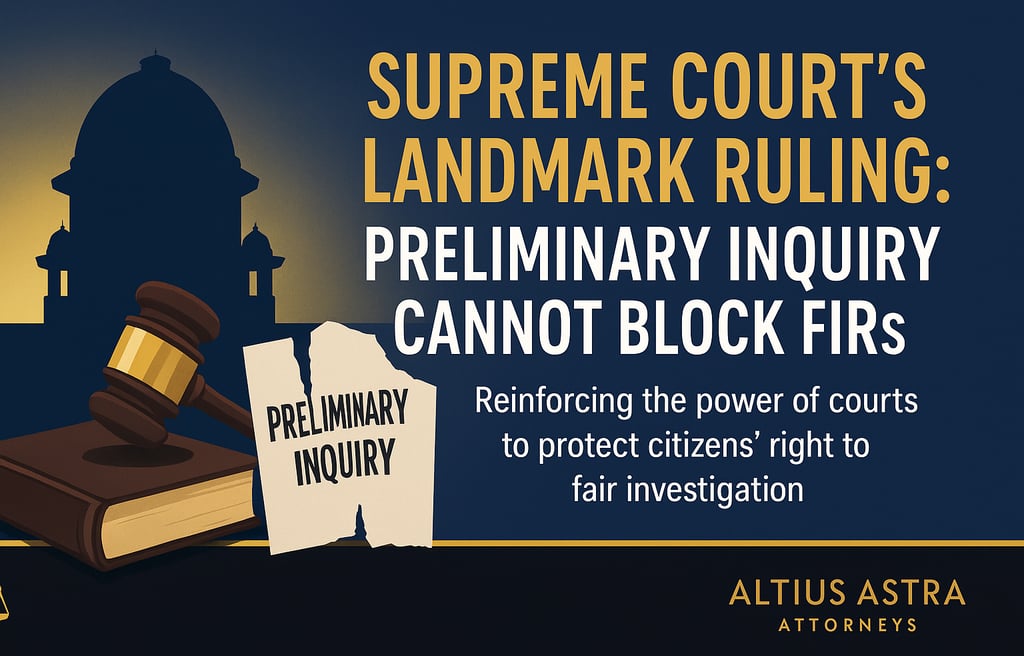Supreme Court’s Bold Ruling on FIR Registration: Can Preliminary Inquiries Still Hold Ground?
The Supreme Court of India’s latest ruling on FIR registration clarifies that a preliminary inquiry cannot stop constitutional courts from directing an FIR when prima facie cognizable offences are disclosed. Explore the judgment, key precedents, and its wider implications for criminal law in India.
Adv. Nadeem Saifi | Partner | Altius Astra Attorneys
9/15/20253 min read


Introduction: A Turning Point for Criminal Justice?
Can a mere preliminary inquiry report block the constitutional courts from directing an FIR registration? The Supreme Court of India has delivered a powerful answer: No.
In a ruling that could reshape how complaints against public officials are handled, the Court observed that when allegations reveal a prima facie cognizable offence, neither the police nor preliminary reports can stand in the way. The judgment not only reinforces Section 154 of the CrPC but also raises serious questions about how agencies like the CBI handle sensitive complaints.
The Case at the Center of the Storm
The controversy stems from appeals filed by former Delhi Police Commissioner Neeraj Kumar and Inspector Vinod Kumar Pandey, challenging the Delhi High Court’s order to register FIRs against them. The allegations dated back to their deputation with the CBI in 2000–2001.
The officers argued that the CBI’s preliminary inquiry had already concluded no cognizable offence was made out. However, both the High Court and the Supreme Court took a different view.
Justice Pankaj Mithal and Justice Prasanna B Varale, delivering the ruling, clarified that:
“A preliminary enquiry is not ordinarily contemplated in law before registration of FIR, and hence cannot oust the power of a Constitutional Court to record its own conclusion.”
Legal Backbone: Why This Judgment Matters
The Supreme Court’s decision doesn’t exist in isolation. It draws strength from two landmark cases:
1. Lalita Kumari v. State of Uttar Pradesh (2014)
This judgment made it crystal clear: if information discloses a cognizable offence, FIR registration is mandatory. No preliminary inquiry is required, except in limited situations (such as matrimonial disputes or commercial offences).
2. Pradeep Nirankarnath Sharma v. State of Gujarat (2025)
Here, the Court reiterated that abuse of official position and corrupt practices fall squarely within the category of cognizable offences. Testing the genuineness of allegations at the FIR stage was seen as premature.
By relying on these precedents, the Court reinforced the principle that investigation should not be throttled at the very threshold.
Why Preliminary Inquiries Are Losing Relevance
At first glance, preliminary inquiries seem useful—they filter out frivolous complaints and save investigative resources. But as the Court noted, they often delay justice and create a false sense of closure.
Imagine this: If every complaint against a powerful public official required a lengthy “verification process,” how many cases would ever reach the FIR stage? This ruling recognizes that access to justice cannot depend on a gatekeeping report.
Expert Insight: A Shift Toward Judicial Oversight
Legal experts suggest this verdict signals a clear message to investigating agencies: courts will not tolerate administrative shortcuts that undermine statutory duties.
For citizens, it means a stronger guarantee that serious complaints will at least be investigated.
For public officials, it raises the stakes—shielding behind preliminary reports may no longer work.
Some also argue this could open the floodgates for more FIRs, especially in politically sensitive cases. But isn’t that precisely what accountability demands?
Broader Implications: Beyond This Case
For Investigating Agencies – The CBI and police can no longer lean heavily on preliminary reports as shields.
For the Judiciary – High Courts and the Supreme Court remain empowered to ensure that statutory rights under Section 154 CrPC are not diluted.
For Citizens – Complaints disclosing prima facie cognizable offences gain more credibility, reducing the fear of them being buried under bureaucratic delays.
The Final Word
The Supreme Court has upheld the Delhi High Court’s direction to register FIRs against Neeraj Kumar and Vinod Kumar Pandey. While the CBI’s preliminary report may still be considered during investigation, it is not conclusive.
This verdict is more than just a technical clarification—it’s a reaffirmation of the rule of law. When it comes to protecting the right to fair investigation, the Court has made one thing clear: preliminary reports cannot become roadblocks to justice.
Altius Astra Attorneys
A premier law firm based in Delhi, India, offering legal representation across various practice areas for citizens rights and interests.
© 2025. Altius Astra Attorneys. All rights reserved.
Contact Us
📞 9899290789, 9818786756
📧 contact@altiusastra.com
3C-ED Block, Madhuban Chowk, Pitampura, Delhi-110034
DISCLAIMER
